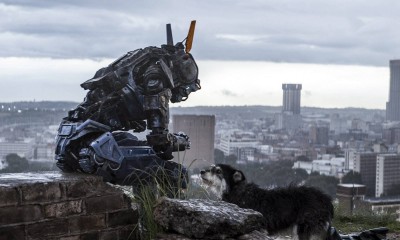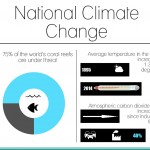
Robotics isn’t the future. It’s the present. So why are we still making movies about robots? Sure, Neill Blomkamp’s Chappie is no ordinary robot — he wears bling. But then again, what robot is ordinary? Perhaps we keep seeing them because evaluating the pros and cons of robotic technology continues to be a great way to frame societal commentary.
Either way, the robot/artificial intelligence genre has blown up in recent years, so it isn’t difficult to guess the general progression of events (and emotions) taking shape in “Chappie.”
It is 2016 (note the lack of futurism) and Johannesburg, South Africa is ridden with corruption and violent crime – not a surprising setting for Blomkamp (“District 9”, “Elysium”). News clips flood the opening scene, once again illustrating a broken Johannesburg, riddled with corruption and crime. Out of the chaos, Tetra Vaal Robotics has ushered in the solution and the future: a titanium robotic police force of “scouts” that can be controlled remotely and resist hacking (cue foreshadowing).
As the company’s main programmer, Deon (Dev Patel) is at the heart of the Scout project, but he wants to be more. Deon wants to create true artificial intelligence — robots that are practically human, or even smarter and more creative. Unfortunately, his boss (Sigourney Weaver) won’t allow this kind of nonsense in her corporation.
Deon finds a growing enemy in fellow engineer Vincent, a mad genius type played convincingly (if a little too earnestly) by Hugh Jackman. Deon’s project is draining money and support away from Vincent’s army-like giant robot project that the police force deems “overkill” (remember: foreshadowing).
Meanwhile, we meet Yolandi Visser and Ninja (Watkin Tudor Jones) of real-life rambunctious hip-hop-“zef” duo Die Antwoord. The two partners in crime play more gangster versions of themselves, and they’re in the middle of a drug deal gone sour. Along with their friend Amerika (Jose Pablo Cantillo), the three are about to find themselves dead if they don’t deliver $20 million to crime-ring leader Hippo (Brandon Auret) in a week.
They need to pull off a large heist, but they can’t have those pesky scouts getting in the way. Yolandi has a master plan: find the robot engineer and get him to hand over their “remote.”
When they kidnap Deon, however, Yolandi and Co. get more than they bargained for. Deon has a broken robot in his trunk, salvaged – er, stolen – for experimentation. Ninja demands Deon reboot the robot with his artificial intelligence program and turn him into the “illest gangster on the block” that can help them with said heist.
And thus Chappie is “born.” The lights come on, and behold — a scared, almost cute baby animal in the form of a beat-up robot. Chappie (voiced and played by Sharlto Copley through performance-capture technology) is a blank slate: timid, innocent and innately curious.
Just like that cute baby, Chappie momentarily brings everyone together. It’s all broken by Ninja, who doesn’t immediately connect with the robot-child. Chappie is scared of guns and makes a promise to “Maker” Deon that he won’t engage in violence or crimes. “Go play hide and seek with your titanium baby!” Ninja shouts at Yolandi, who has already taught Chappie that she is “Mommy.” It’s one of Ninja’s many wonderfully silly one-liners.
Eventually, though, Ninja starts teaching Chappie to be “cool,” and slyly tricks him into training for the violent heist. It’s thought-provoking and ironic, though, how the tables turn. Yolandi, who makes a living on violence, feels awful for this former robo-cop when he gets bullied and battered by this same fear and violence.
Dev Patel, for his part, plays a “good guy,” but one that is fairly one dimensional. His love for Chappie is genuine, but his overall personality is slightly forgettable. This could be due to the overwhelmingly bright characters of Ninja and Yolandi. Indeed, it’s difficult to tell whether the real star of the film is Chappie or Die Antwoord. In that way, it’s likely that “Chappie” may be better received amongst fans of Die Antwoord, or at least those familiar with the duo’s eccentric antics, for they make you feel like you’re part of an inside joke throughout the film.
Otherwise, “Chappie” suffers from, among other things, poorly constructed dialogue, which sometimes resorts to throwing the thematic and philosophical elements of the story into your face. Yolandi in particular has some very cheesy lines, especially while reading from Chappie’s children’s book, “Black Sheep.” Yet while Die Antwoord don’t have extensive acting skills, they redeem themselves through charisma, along with their music that colors many scenes.
During his time with Deon, Chappie learns all the things we learn in kindergarten — to keep promises, to be nice. But that isn’t real life, is it? Chappie’s evolution becomes complete not when he learns slang, painting and love, but when he truly encompasses the full scope of human emotions — hate, anger and vengeance. His “change of heart” illustrates that there can be no perfect robots, because there are no perfect humans.
A simultaneous strength and let-down of “Chappie” is its deeper foray into the philosophical — what is consciousness, what is the soul and are our bodies simply temporary houses for these “energies?” It’s a great point to explore, but “Chappie” rushes the issue and rapidly jumps from science fiction to metaphysical fantasy.
The film also walks the line between cute and badass, which sometimes succeeds with humor but sometimes falls short with oozing cheesy residue. Still, it’s captivating to watch Chappie become more and more human before our eyes. It’s a cringe-worthy painful moment when Chappie’s arm is brutally cut off, although he’s a robot and can’t feel anything. Or can he? The liquid oozing out of his metal frame almost seems like blood.
It’s hard to tell if the film is pro- or anti-robotics, but once again, that may no longer be the point. It’s always more powerful to examine ourselves through the lens of something foreign, and “Chappie” manages to do the trick. “Why you humans always do this? Why you always lie?” Chappie pleads with Ninja at one point, and you have to wonder with him. But if anything else, and if you’re not interested in the robot rhetoric, go see “Chappie” for Die Antwoord.















Maybe you’re just trying to see every movie through a lens of it having a deep metaphysical meaning? This movie is not deep, and is not trying to be. It’s true to, and consistent with itself. Consistent with it’s essence of not being deep, but instead providing a simplistic and kind world view for an artistic effect.
The robot is learning cartoonishly fast and is acting as a comics character. The technology company itself functions too fast and too straight-forward to be considered realistic. The technical progress itself is obviously way sped up. Every single character is simplified and has a childish sense of self-righteousness to them. All of this makes perfect sense and fits perfectly into the premise of this movie.
Now, if it would have any parts of it that would complicate things with too much realism, or too much philosophy, now THAT would kill the congruence of Chappie.
“what is consciousness, what is the soul and are our bodies simply temporary houses for these “energies?””
This sounds like a more of a question in your head, than in the movie. I think Chappie makes it pretty clear when the robot fixes the problem of downloading a consciousness from a human. A problem which Chappie’s maker first says is “impossible”, and which Chappie solves with no particular difficulty or even explanation in one minute of movie time. That is not an invitation for the viewer to start thinking philosophically, that is the movie trying to tell you to actually drop your attempts to philosophizing about everything and pause them for the duration of the movie.
So all-in-all, what metaphysics??
Do you consider the question “why did you make me so I could die” metaphysical? In that case, you would see metaphysics in every Disney cartoon. This is not a deep movie that tries to compete with The Matrix or Space Odyssey. This is “Chappie”. Don’t you hear even in the name that you shouldn’t look for metaphysics or whether it’s “pro-robotics” in it and just enjoy it for a congruent, honest and consistent utopia of a compassionate and simplified science fiction flick that it is?